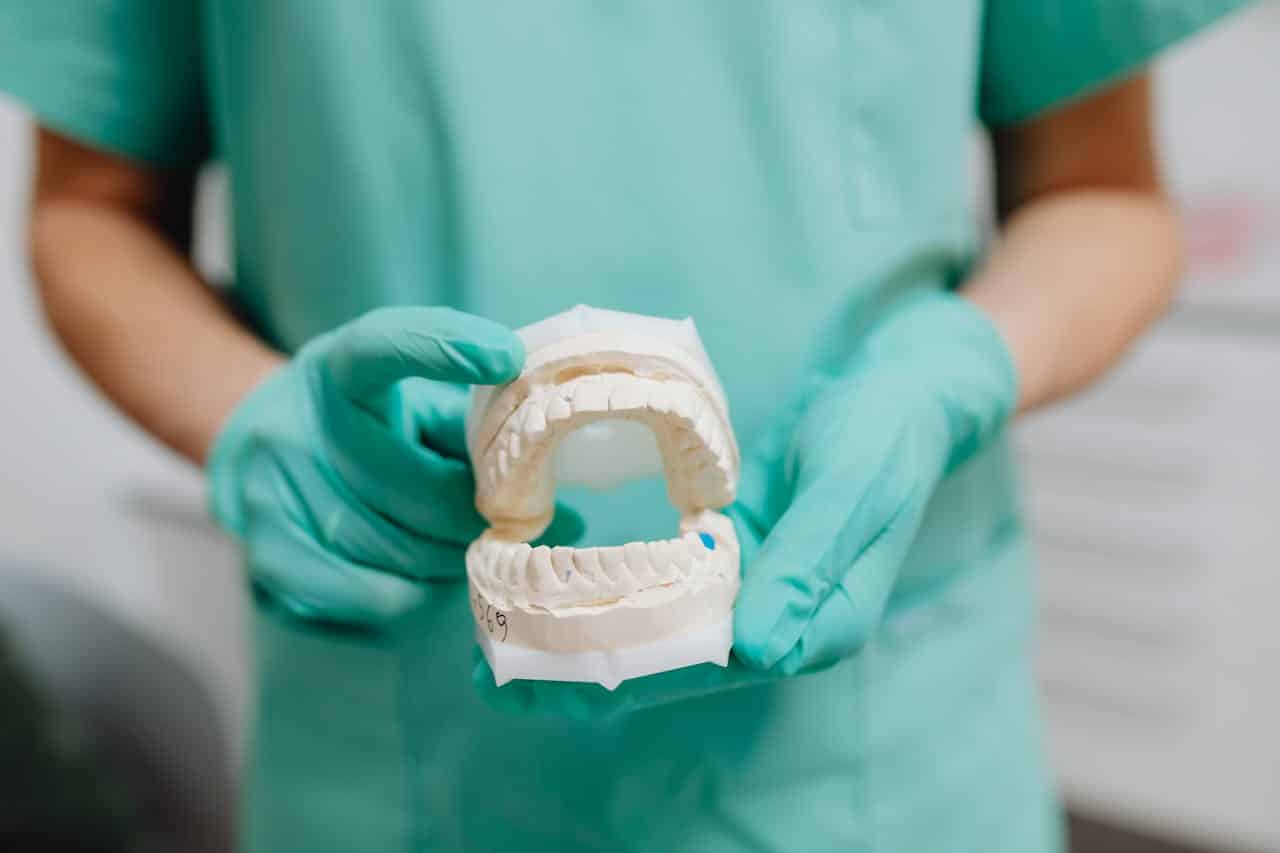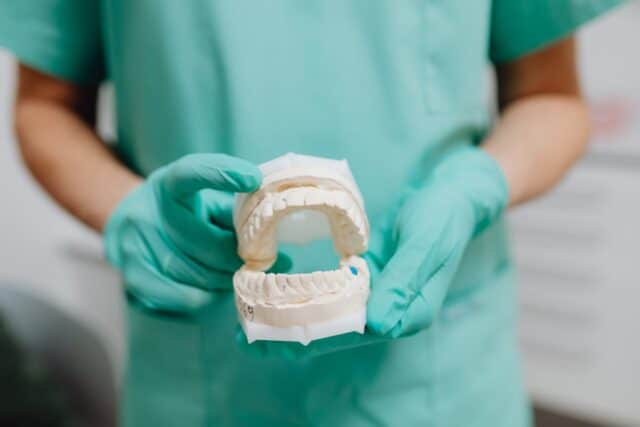Partial dentures are a transformative dental solution for patients who have lost some teeth. They provide functional and aesthetic benefits, enabling individuals to chew, speak, and smile confidently.
The decision to get partial dentures can feel overwhelming, especially without having all the information. This guide will walk you through what to expect before and after partial dentures so you are well-informed and prepared for this process.

What Are Partial Dentures?
Partial dentures are designed to replace one or more missing teeth. Unlike full dentures, which replace entire arches of teeth, partial dentures can be tailored to fill the gaps left by missing teeth while using your remaining natural teeth for support.
Partial dentures are custom-made for each patient. Each one typically consists of a gum-colored acrylic base that holds the artificial teeth and a framework made of metal or flexible materials to anchor the denture in place.
Benefits of Partial Dentures
Partial dentures offer a range of advantages that go beyond restoring missing teeth:
- Restores the Ability to Chew and Speak: Partial dentures fill in the gaps, improving your ability to articulate sounds clearly and allowing for a more natural biting and chewing motion.
- Prevents Shifting Teeth: When teeth are missing, the adjacent teeth can drift into the empty spaces, causing misalignment and potential bite issues. Partial dentures stabilize your existing teeth by maintaining proper spacing and alignment.
- Offers an Affordable Alternative: While dental implants and fixed bridges are excellent solutions for tooth loss, they can be costly or invasive. Partial dentures are removable and provide a less invasive and economical option.
Before Getting Partial Dentures
Preparation is essential to ensure a successful experience with partial dentures. Here’s what to expect in the lead-up to your new smile:
1. Dental Evaluation and Consultation
The process begins with a comprehensive dental evaluation. Your dentist will assess your oral health, take X-rays, and evaluate the condition of your remaining teeth and gums. This is crucial to determine if you are a good candidate for partial dentures and to identify any necessary preparatory treatments, such as fillings or extractions.
2. Choosing the Right Type of Partial Denture
There are different types of partial dentures, and your dentist will recommend the best option based on your needs and preferences:
- Acrylic Partial Dentures: Affordable and lightweight but less durable.
- Cast Metal Partial Dentures: Sturdy and long-lasting, with a metal framework.
- Flexible Partial Dentures: Made from a flexible resin, offering comfort and a natural appearance.
3. Pre-Denture Dental Work
Before fabricating your partial dentures, your dentist may address tooth decay, gum disease, or structural problems. This ensures a healthy foundation for the appliance and improves its longevity.
4. Impression Taking
Impressions of your teeth and gums are taken to create a precise mold. This mold serves as the basis for crafting partial dentures that fit securely and comfortably in your mouth.
Transitioning to Partial Dentures
The adjustment period for partial dentures is crucial. Here’s what to anticipate:
1. Fitting Appointment
Once your partial dentures are ready, your dentist will fit them to ensure proper alignment and comfort. Adjustments may be made during this appointment to eliminate pressure points or discomfort.
2. Learning to Wear Your Dentures
Initially, wearing partial dentures may feel strange, and it’s normal to experience minor soreness or difficulty speaking. With practice and time, these issues are usually resolved. Your dentist will provide guidance on inserting and removing your dentures properly.
3. Eating with Partial Dentures
Adjusting to eating with partial dentures requires patience. Start with soft foods and practice cutting your food into smaller pieces. Later, as your dentures become more comfortable, you can introduce harder foods to your diet.
4. Maintaining Oral Hygiene
Partial dentures require daily cleaning to remove food particles and plaque. Your dentist will instruct you on how to care for your dentures and the importance of thoroughly cleaning your natural teeth and gums.
After Getting Partial Dentures
Once you’ve grown accustomed to the difference between before and after partial dentures, maintaining their condition and oral health is key to long-term success.
1. Routine Cleaning and Maintenance
- Daily Cleaning: Use a soft-bristle toothbrush and non-abrasive denture cleaner to clean your dentures. Avoid using hot water, which can warp the appliance.
- Overnight Soaking: Before bed, soak your dentures in a denture-cleaning solution or plain water. This keeps them moist and prevents damage.
- Gum Care: Massage your gums with a soft toothbrush to improve circulation and remove plaque.
2. Regular Dental Checkups
Regular dental visits ensure your dentures fit correctly and your oral health remains optimal. Your dentist may adjust your dentures over time to accommodate changes in your mouth, such as bone resorption or gum shrinkage.
3. Managing Common Challenges
- Discomfort: Mild discomfort is common initially but should improve as you adjust. Persistent pain may require adjustments by your dentist.
- Speech Difficulties: To adapt to your new dentures, practice speaking aloud or reading. This will help your tongue and facial muscles adjust to their presence.
- Slippage: Partial dentures should fit securely, but occasional slippage may occur, especially during eating or speaking. A denture adhesive may help, though persistent issues warrant a dental consultation.
4. Longevity and Replacement
With proper care, partial dentures can last 5 to 10 years. However, they may require replacement due to wear, breakage, or changes in the shape of your mouth. Regular evaluations ensure your dentures continue to function effectively.
Life After Partial Dentures
Partial dentures can significantly improve your quality of life, though it can vary between patients and their ability to adapt and maintain their oral health:
- Improved Confidence and Functionality: Many patients report an immediate boost in self-esteem and comfort once they adapt to their dentures.
- Enhanced Oral Health: Partial dentures prevent further oral health issues by stabilizing your remaining teeth and distributing chewing forces evenly.
- Building a Routine: Incorporating the care and maintenance of your dentures into your daily routine ensures their longevity and effectiveness.

Achieve a Complete Smile with Partial Dentures from Archpoint Implant Dentistry
Partial dentures are a practical and life-enhancing solution for individuals with missing teeth. By understanding the process before and after partial dentures, you can approach the journey with confidence and ease.
Reclaim your smile with Archpoint Implant Dentistry. Book an appointment with Archpoint today and take the first step toward a more confident, functional, and healthy smile.








